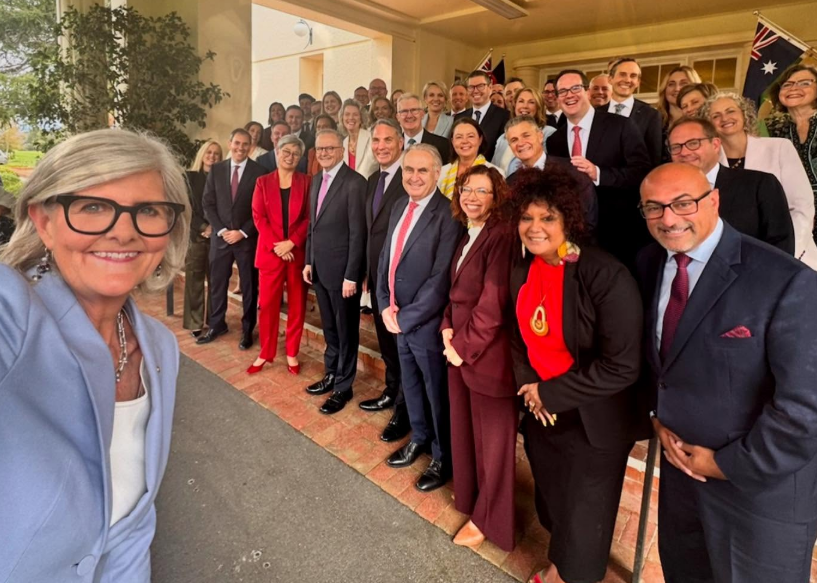
The Albanese Ministry – sworn in, but not freshly minted. Photo: Sam Mostyn.
Every once in a while (but far too frequently), a phrase that was already tacky becomes overly embraced by certain sections of the public service, the media, the commentariat and the wider community.
Corny two-word descriptions become extremely annoying.
The current contribution to this mangling of the language is ‘newly minted’, and its just-as-dodgy cousin ‘freshly minted’.
The worst culprits right now are from the media, who either think it’s a cool and catchy way to describe a new appointment – or they don’t think about it at all.
On news blogs, it’s not uncommon to see the phrase repeated in headlines and opening lines half a dozen times in one 30-second scroll of a site, courtesy of the federal election and the ongoing list of positions being filled.
It’s not much of a stretch to say you could see a news blog that reads: The re-elected Prime Minister leaves behind the newly minted Opposition Leader and newly minted Greens leader to pay his respects in Rome to the freshly minted Pope.
The national broadcaster is probably the worst culprit at the moment, although it’s not alone by any means.
It is a horrible cliche that has no basis in fact or reality, yet is used to death as though it is a masterful use of the language.
None of these new Ministers, leaders, coaches, etc, actually came out of a mint.
They’re not $2 coins. Neither are they phrases or ideas, for which the term could be more reasonably applied (but only just).
What’s worse, it sounds stupid.
Yes, language evolves, and terms can take on a wider meaning than they once did. But stop it already with this one.
Public servants, please don’t take this up as a standard style for the Australian Public Service. You’re better than that.
In the early 2000s, former Paul Keating speechwriter Don Watson did a ripper job in bringing silly and overused phrases to light with his books Death Sentence: The Decay of Public Language and the follow-up Watson’s Dictionary of Weasel Words.
He railed on bureaucratic speech so eloquently and so convincingly that it seemed for a time that clear English would make a long overdue comeback.
“In public life the language has never been held in less regard,” he wrote in 2003.
“It withers in the dungeons of the technocratic mind. It is butchered by the media. In politics it lacks all qualifications for the main game.”
But the corporate corruption of the language hasn’t relented.
To be fair to the public service, the use of language has vastly improved since Watson opened the door to a better way.
Jingoistic jargon and doublespeak still exist, but the very best of agencies have done away with words and terms that are designed to confuse or shield.
Some still live in the dark ages and are happy with their bureaucratic talk and fancy terms where the simple would serve much better.
Politicians will probably always love that they can speak for three minutes without actually saying anything as there remain so many weasel words at their disposal.
And why give a clear and simple answer when there are so many big words and clever terms to choose from? (Apologies to those pollies who have long been engaged in good old plain speech.)
‘Newly minted’ isn’t necessarily bureaucratic talk – it’s just dumb.
Some might think it’s a clever way of saying ‘new’ – but it’s just dumb.
‘Newly appointed’ maybe? Or maybe just ‘new’.
As you can tell, the current overuse of the term ‘newly-minted’ is annoying the hell out of me.
It’s my gripe, I know.
What would Watson say? What would Hemingway think?
I’m off for a freshly minted herbal tea.
Original Article published by Chris Johnson on Region Canberra.


